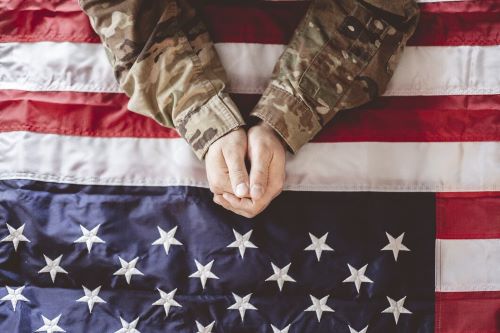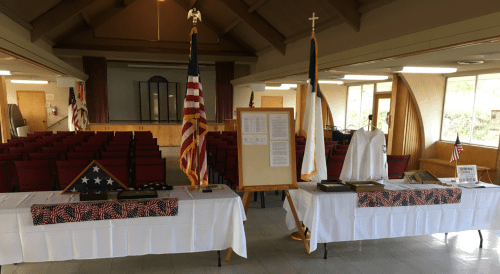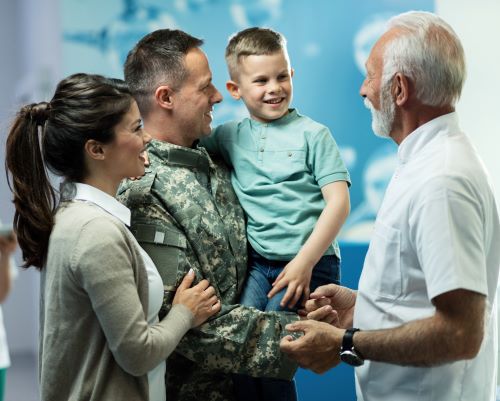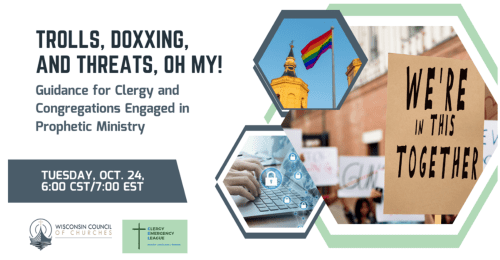How can we honor our veterans and current military personnel at church in a way that acknowledges their service without glorifying war or inserting patriotic displays in worship?
Clergy and congregations can sometimes struggle with how address the complexities of Veterans Day, Memorial Day, Armed Forces Day, and other occasions that recognize military personnel, veterans, and their families. These holidays can be especially problematic as the cultural influence of Christian Nationalism pressures churches to equate faith with patriotism and military service.

In this piece, I draw on different perspectives from clergy, laity, and those who have served in the military to share some suggestions for appropriate ways to honor veterans and military personnel at church – without tipping into Christian Nationalism or causing unintentional harm.
Don’t assume everyone feels the same way about military holidays.
Keep in mind — not all veterans, current military personnel, or their families feel the same way about military holidays. It’s important to recognize that there can be a range of emotions when it comes to national days of recognizing the military and veterans.
For some, their time in the military fills them with pride and they want to feel appreciated by their church family. For others, there may be immense pain, grief, trauma, or shame associated with their time of service.
Mental and physical trauma are common among veterans which often go unrecognized, dismissed, or shamed. In addition, women, transgender individuals, and people of color in the military often deal with bias, stereotypes, and outright sexism, genderism, and racism.
All of this can result in emotions such as anger, regret, sadness, or overcompensation with hyper-patriotism. Also, it’s possible for veterans and military personnel to feel a mix of all these emotions.
Members of military families may either share these emotions alongside their loved one who served or have very different feelings and experiences. While many spouses, children, parents, and other family members feel pride for their loved one in the military, some have also experienced physical, emotional, or mental abuse from the servicemember in their family.
So, when your church is considering how to honor veterans, those currently serving in the military, and their families, it’s important to recognize these complexities instead of assuming that everyone wants the church to get on board with a patriotic worship service.
Harmed by the military; causing harm to others
Some who served in the military would rather leave that time in their life behind. Many who served were harmed by their fellow soldiers or those in power above them. Some have suffered sexual harassment or violence. Others deal with Post Traumatic Stress Disorder and other mental health challenges that can lead to unemployment, substance abuse, loss of a home, and loss of relationships.
Still others may have found themselves charged with tasks that caused injury to others that they now regret.
For example, Rev. Joelle Henneman, pastor of United Methodist Church for All People in Columbus, Ohio, offers this reflection:
Whenever someone thanks me for my military service I feel awkward. I served in the Air Force for 20 years and am grateful for many experiences and relationships that formed who I am. However, I spent the majority of that time as a historian, documenting combat operations that resulted in, and sometimes even intentionally targeted, civilians.
I watched the military culture change from war as a last resort after all political avenues had been expended, to general officers gleefully looking forward to “blowing things up and killing people.” As a result, I retired as a disgruntled pacifist. Veteran’s Day is a difficult day for me, knowing that the analysis I provided as a historian made war more lethal. All who serve in the military sacrifice something; I sacrificed my morality.
Ann Franek, who served in a Navy military band, said that in one of her deployments to southeast Asia, she saw extreme poverty. Yet she was frustrated because “my job didn’t allow me to do anything other than play music. I questioned why we can’t do anything to help, and this left me with a heavy amount of guilt.”
She further reflected, “I didn’t know what moral distress was until after my time in the military. Learning that I had to act contrary to my personal values and what I think is ethical really weighed heavily on me.”
There are, however, many who are “comfortable, proud, and readily identify with our service,” explains Erik Backus, a retired US Army Lieutenant Colonel, and member of a Lutheran church. “One of the biggest mistakes that can be made when it comes to addressing veterans, especially around specific related holidays, is to assume we are all broken pots that you have to handle with proverbial ‘kid gloves’ or that we have had experiences that are so devoid of anyone else’s in society that we cannot be empathized with, if not understood.” You can read his companion piece to my article here.
Ask questions and listen deeply
With all of this in mind, one of the best things a pastor and congregation can do is engage in one-on-one conversations with veterans and those currently serving in order to deeply listen to what the experience was like for them. That may be more important to them than a public display of military memorabilia in the church.
Ask them what they would like their church to do regarding honoring veterans and current military personnel and then listen to what they say. Make space for them to express their thoughts and feelings, to share their memories . . or to say nothing at all.
It may be the case that for some, their house of worship is the one place they feel they can just be who they are – a beloved child of God – without any need to tout their military service.
Theological problems with honoring military holidays in worship
There are also theological problems with recognizing military holidays. For example, while our culture often glorifies soldiers’ “sacrifice,” using such a word in the church takes on a theological meaning. Sacrifice is done to animals in religious rituals; they have no choice. What does it mean to use that language about people who volunteered for military service or who were drafted?
Also, when we say that those who were killed in action made “the ultimate sacrifice,” how does this square with our theology around Jesus, the crucifixion, and the resurrection? I once heard a pastor equate veterans with Jesus himself by saying that they were sent to die, just as God had sent Jesus to die. This is incredibly problematic framing, and we need to avoid using such language when talking about veterans.
The difficult juxtaposition of war and peace, violence and non-violence
In a speech on his final day of military service, Dec. 27, 2012, former Army General Norman Schwarzkopf said: “Any soldier worth his salt should be antiwar; and still there are things worth fighting for.” His words crystallize the conundrum of honoring veterans and military personnel.
For example, what does it look like to honor those who have given their minds, bodies, time, and even their lives for something they thought was “worth fighting for,” while also recognizing that every military conflict is a result of failure? The failure to communicate; the failure to share equitably; the failure to forgive; the failure to respect difference – these and more can all lead to armed military conflict. A sermon that recognizes these complexities can critique the military system without criticizing the people who serve in it.

Do’s and Don’ts for Honoring Veterans and Military Personnel at Church
There are appropriate and inappropriate ways to honor veterans and military personnel at church. The guiding principle is that worship is intended for God; so, anything that competes with, displaces, or usurps the purpose of worship is something to avoid. Generally speaking, the time to honor veterans and those currently serving is either before or after the worship service, not during the liturgy itself.
Here are some ideas for appropriately honoring veterans and those currently serving.
DO’s
Before the day of honoring
- Engage in personal conversation with veterans, current military personnel, and their families. As much as they feel comfortable, invite them to tell you about their time in the service, what it meant for them, what they struggled with then, and what they struggle with now. You could also invite a small group of them to a joint conversation, if they are willing. Ask for what they need and how their church can best support them.
- Prepare the congregation. In the church newsletter and bulletin, include a short, written description of what the military holiday is (and is not), and explain how the church will be honoring veterans and those serving in the military, as well as military families.
- Invite letters of gratitude. Encourage people to send cards to the church to be given to those who will be honored. Children can draw pictures or write their own thank you notes to be included.
On the day of honoring
- In the time of announcements, acknowledge veterans and those serving in the military who are present and indicate that they will be honored in a special time after worship.
- During the worship service, offer prayers for all who have served or are currently serving our country. But also include prayers for good leaders and prayers for peace.
- During the fellowship or education time (before or after worship), acknowledge and honor veterans and those currently serving. Encourage them to wear their hats, vests, and medals. Invite them talk about their experience in the military (in 2-3 minutes) and how their faith helped them or guided their decisions while in the military.
- Create a display table in the gathering space (not the worship space) where they can put their flags, medals, vests or uniforms, and a few photos from their time in service.
- Invite a military chaplain to an Adult Forum to talk about the role of faith in military service.
Create space for honoring
- Create an Honor Roll of those who have served in the military and display it in an appropriate location in the building (not in the worship space). Have a list of all from the congregation who have served, including names of those who are deceased. List their names, branch of military, years served, and location of service.
- For the church newsletter, invite a veteran or someone currently serving to share a reflection about their experience in the military and the role of their faith in serving.
- Invite a military chaplain to write an article for the church newsletter about how the congregation can assist, pray for, and advocate for veterans and those currently serving.
Provide and advocate for the needs of military personnel, veterans, and their families
- Organize a care-package event where children, youth, and adults can put together boxes of personal care items and small gifts for those currently serving.
- Host a military support group for those serving, veterans, and/or their families.
- Become familiar with the issues that military personnel and their families face, such as mental health crises, suicide, gun violence, substance abuse and addictions, domestic violence, health care, inadequate housing, and insufficient financial support. Learn about programs of advocacy and how your congregation can support them.
Erik Backus adds additional suggestions for honoring veterans here.

Sample Newsletter or Bulletin Announcement
Remembering our Veterans and Those Serving in the Military
On [date] we will be recognizing and honoring our veterans and those currently serving in the military by displaying their medals and flags on a table in the fellowship hall. We invite our veterans or family members to bring items to display that Sunday. We will also include an honor roll of those from our congregation who have served in the military. Please let the office know to include you by [date] by sending us your name, branch of military, years served, and location of service. Please contact [name] with questions at [email address, phone].
DON’Ts
- Do not recite the Pledge of Allegiance during a church worship service. This is a clear usurping of God’s authority and turns the worship service into the practice of idolatry by elevating the state to the level of God.
- Refrain from any patriotic displays in worship. Putting the flag front and center in the sanctuary is not appropriate. In worship, our allegiance is to God, not a flag or a country. Centering the flag is a type of idolatry. God is beyond any one country or time period. See: U.S. Flag in the Church? Preaching on Patriotic Holidays.
- Refrain from singing patriotic hymns or playing other patriotic music. No one should be forced to or pressured into singing hymns or listening to patriotic music during a worship service. See above for the reasons why this can be particularly painful or traumatic for some individuals.
Expanding and broadening the church’s recognition of those who serve
There is one more question we need to address. Some may wonder: why are we elevating the service and sacrifice of the military over other professions who also serve and sacrifice? What does this communicate about the value and worth of certain professions over others? And how does this square with the “priesthood of all believers,” which holds that everyone can witness to and serve the purposes of God, no matter what their profession?
If your church wants to honor military personnel and veterans on certain days, it would be appropriate to schedule other days to recognize those in professions beyond the military who also serve their country and give of themselves for the greater good.
For example, the Sunday of Labor Day weekend is an ideal time for honoring all who labor.
A church could invite people to bring items that symbolize their work and host a forum about how faith helps people in their professions.
Emergency personnel, law enforcement officers, those in the medical profession, public school teachers, social workers, mental health providers, and workers in dangerous jobs also give of themselves so that their community – and our country – might be better. Thinking more broadly about what it means to give of oneself for the greater good – and what it costs individuals and their families – can guide a congregation to be more inclusive and expansive in their recognition and appreciation of those who serve.
I am grateful to the following individuals on the Clergy Emergency League Steering Committee who gave input on this article: LaVinnia Pierson, Joelle Henneman, Robert Franek, Nelson Rabell-González, Stephen Fearing, Carolyn Smith Goings, Pamela Griffith Pond, and Lauren Grubaugh Thomas. Also thanks to Keith Klemba, U.S. Army Veteran, for his contributions as well.
Read also:
The Big Red, White, and Blue in the Room: A Sermon about Deliberating the Flag in Church
This Flag Has Legs: A Sermon Inviting Dialogue about Flag Placement in Church
Flagging the Flag – Idolatry and Freedom: Preaching Exodus 20:1-6

Trolls, Doxxing, and Threats, Oh My! Guidance for Clergy and Congregations Engaged in Prophetic Ministry. Tuesday, Oct. 24, Online! 7:00 – 8:30 p.m. Eastern. Featuring: JAMES L. SANTELLE, Former United States Attorney for the Eastern District of Wisconsin; PARDEEP KALEKA, co-director of Not In Our Town, specializing in community hate prevention and de-radicalization specialist with Parents4Peace; REV. LAUREN GRUBAUGH THOMAS, Episcopal priest, Littleton, Colorado; REV. BILL KNEZOVICH, Pastor of Our Saviour’s Lutheran Church in central Fresno, Calif. Co-moderators: Rev. Dr. Leah Schade and Rev. Cathy Christman. Co-hosted by the Clergy Emergency League and the Wisconsin Council of Churches. Register here: https://www.wichurches.org/2023/09/trolls-doxxing-and-threats/

The Rev. Dr. Leah D. Schade is the Associate Professor of Preaching and Worship at Lexington Theological Seminary in Kentucky and ordained in the ELCA. Dr. Schade does not speak for LTS or the ELCA; her opinions are her own. She is the author of Preaching in the Purple Zone: Ministry in the Red-Blue Divide (Rowman & Littlefield, 2019) and Creation-Crisis Preaching: Ecology, Theology, and the Pulpit (Chalice Press, 2015). She is the co-editor of Rooted and Rising: Voices of Courage in a Time of Climate Crisis (Rowman & Littlefield, 2019). Her newest book is Introduction to Preaching: Scripture, Theology, and Sermon Preparation, co-authored with Jerry L. Sumney and Emily Askew (Rowman & Littlefield, 2023).













